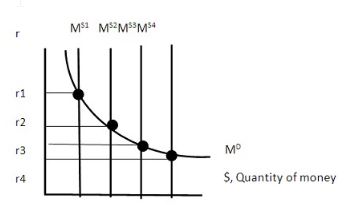If the money supply in the economy were at MS2, and the Federal Reserve Bank used open market operations to move money supply to MS3, the overall direct result in the economy would be:

A. Aggregate demand shifted in, causing GDP to fall.
B. Aggregate supply shifted in, causing GDP to fall.
C. Aggregate demand shifted out, causing GDP to rise
D. LRAS move to the FE level of output.
C. Aggregate demand shifted out, causing GDP to rise
You might also like to view...
Average labor productivity is the
A) amount of workers per machine. B) amount of machines per worker. C) ratio of employed to unemployed workers. D) amount of output per worker.
Financial markets
A) channel funds indirectly between borrowers and lenders. B) channel funds directly from lenders to borrowers. C) act as go-betweens by holding a portfolio of assets and issuing claims based on that portfolio to savers. D) generally provide lenders with lower returns than do financial intermediaries.
Len is putting in a new swimming pool. He can either heat his pool with natural gas or with solar power
If he chooses solar power it will cost him more today, but he will recover these costs over the next 7 years in savings on his natural gas bill. The solar heater is expected to last 12 years. Len: A) will put in the solar heater regardless of the discount rate because the savings in natural gas outweigh the initial cost of the solar heater. B) is more likely to install the solar heater as the discount rate increases. C) is more likely to install the solar heater as the discount rate declines. D) will not put in the solar heater unless he is an environmentalist.
When government spending increases, consumption also increases via the multiplier process.
Answer the following statement true (T) or false (F)